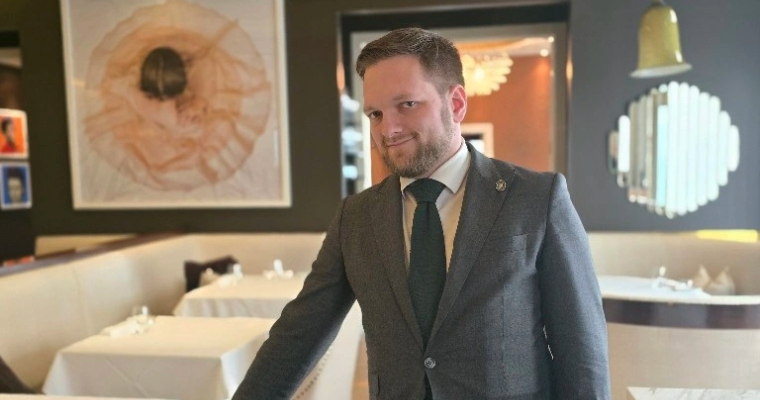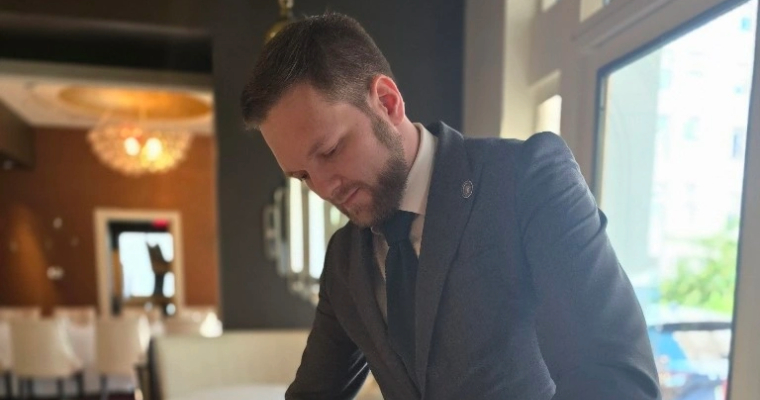Early Bird Ends
January 31, 2025
Judging
Date
May 19, 2025
Winners Announcement
June 10, 2025

Though becoming a sommelier was not Christopher Fagan’s first choice of career, he has grown to love wines and takes delight in sharing his passion with guests. He personally likes that he gets to recommend some rare and iconic vintage wines that are more than 20 years old. Christopher Fagan tells Sommelier Choice Awards everything about his career and the successful beverage program he runs at Fiola as the Head Sommelier.
Back when I was a server at Seasons 52, I did develop an interest in wine but even then, my first priority was to begin a full-time career as a Brazilian Jiu-Jitsu competitor and eventually get into Mixed Martial Arts (MMA). However, I had to rethink that plan after tearing my Achilles tendon. Eventually, I began focusing more seriously on my career in the hospitality industry and took some exams before deciding that working in restaurants would become my primary career path. Fast forward to today and I am the head sommelier at the Italian restaurant Fiola in Washington, DC, where I have the unique pleasure of caring for a robust list of global wines with a heavy focus on one of my favorite countries to study and consume: Italy. The contemporary Michelin-starred restaurant features a list of Barolo and Barbaresco bottlings dating back to the 1950s as well as representing major regions of Italy. It's a joy to be able to share that with guests on a nightly basis.
Also read: Top Italian Wine at Sommeliers Choice Awards 2025 to Receive Exclusive U.S. Importer Consultation

Image Title and Credits: Christopher Fagan at the Fiola restaurant
When I recommend wines to people, their taste preferences play a major role in the decision-making. I start off by asking them about their usual choice of beverage. I also ask them if they remember enjoying a particular wine or any other alcoholic beverage. Depending on their answers, I get a better understanding of their taste preferences. Then, I factor in the dish they have ordered before picking a bottle of wine that will pair well. One thing to remember when suggesting wine is that it can be quite easy to lose sight of what they would personally like if you are too focused on suggesting a drink that excites you. To make sure that they enjoy the food and wine pairing, it is important to listen well while conversing with the guests and figuring out what they would specifically like. Through all this, it helps to remember that some guests prefer to talk more while others like service defined by silence and precision. Creating a bespoke experience is one of the intangibles that makes all the difference.
[[relatedPurchasesItems-61]]
First and foremost, I would ensure that they know how each department in the restaurant works. I would take the trainees inside the wine cellar so that they can explore all the options and have them watch the chefs prepare food so they have a good understanding of the flavor and ingredients in each dish. I would follow it up with some practice sessions where I teach them precision and accuracy in their pour amounts. I try to keep the training intentional and comprehensive so that my new teammate can feel empowered once they're let off the leash and allowed to be on their own.

Image Title and Credits: Head Sommelier Christopher Fagan
I have always personally feared that my knowledge would become outdated, so I constantly update myself by reading articles to know what is currently happening in the industry. I don’t just stick to reading about wines; instead, I also like researching all the other beverages. I want to recognize the niche where I can positively impact the way people approach and interact with drinks for years to come. In order to do that, I feel that I need to acquire knowledge from different sides of the beverage industry to get clarity on the opportunities present in each niche. At the same time, I also understand the importance of not forgetting what I already know. To keep me from forgetting, I listen to the voice recordings of myself reading my flash cards. While many might find the technique super boring, it has actually worked well for me, especially when there is a time crunch.
Also read: Challenges Faced by the Wine Industry in 2024: What’s the Reason Behind the Decline?
While many factors about a beverage program rely largely on the property where the drinks are served, my advice is to document and list out the banquet selection, which will definitely come in handy for any beverage program. If you take our restaurant, for instance, we keep a list of rare wines that we preserve using systems like Repour and Coravin, which lets us have our library pairings and serve those high-end wines by the glass. This method may not give a quick increase in sales as you would expect from large bottles. However, it does show a slow and gradual increase, which is more evident in the year-over-year sales growth graph. In other words, it's more a game of inches, presenting guests with small increases in high-value options that cultivate a relationship of trust in our program.
Header image by Christopher Fagan
Related links
Let's Grow Wine: Instagram Marketing Way
How to Create A Winning Wine List
2025 Sommeliers Choice Awards submissions is now open for domestic and international wines. Enter your Wines now to get the early bird pricing.
